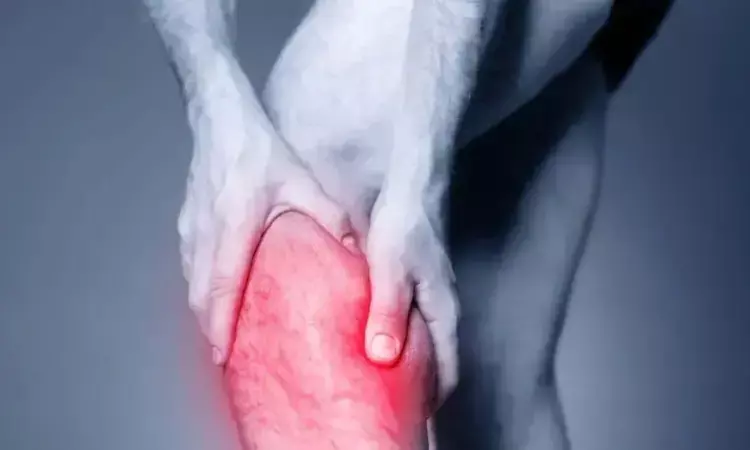- Home
- Medical news & Guidelines
- Anesthesiology
- Cardiology and CTVS
- Critical Care
- Dentistry
- Dermatology
- Diabetes and Endocrinology
- ENT
- Gastroenterology
- Medicine
- Nephrology
- Neurology
- Obstretics-Gynaecology
- Oncology
- Ophthalmology
- Orthopaedics
- Pediatrics-Neonatology
- Psychiatry
- Pulmonology
- Radiology
- Surgery
- Urology
- Laboratory Medicine
- Diet
- Nursing
- Paramedical
- Physiotherapy
- Health news
- Fact Check
- Bone Health Fact Check
- Brain Health Fact Check
- Cancer Related Fact Check
- Child Care Fact Check
- Dental and oral health fact check
- Diabetes and metabolic health fact check
- Diet and Nutrition Fact Check
- Eye and ENT Care Fact Check
- Fitness fact check
- Gut health fact check
- Heart health fact check
- Kidney health fact check
- Medical education fact check
- Men's health fact check
- Respiratory fact check
- Skin and hair care fact check
- Vaccine and Immunization fact check
- Women's health fact check
- AYUSH
- State News
- Andaman and Nicobar Islands
- Andhra Pradesh
- Arunachal Pradesh
- Assam
- Bihar
- Chandigarh
- Chattisgarh
- Dadra and Nagar Haveli
- Daman and Diu
- Delhi
- Goa
- Gujarat
- Haryana
- Himachal Pradesh
- Jammu & Kashmir
- Jharkhand
- Karnataka
- Kerala
- Ladakh
- Lakshadweep
- Madhya Pradesh
- Maharashtra
- Manipur
- Meghalaya
- Mizoram
- Nagaland
- Odisha
- Puducherry
- Punjab
- Rajasthan
- Sikkim
- Tamil Nadu
- Telangana
- Tripura
- Uttar Pradesh
- Uttrakhand
- West Bengal
- Medical Education
- Industry
Rivaroxaban Enhances Walking Distance in Peripheral Artery Disease Patients When Combined with Aspirin: NEJM

Brazil: A recent clinical trial has shown that adding rivaroxaban to a standard aspirin regimen significantly improves walking distance for patients suffering from intermittent claudication due to peripheral artery disease (PAD). The study, published in NEJM Evidence, found that a combination of 2.5 mg of rivaroxaban twice daily with 100 mg of aspirin daily led to better results in a 6-minute walking test compared to aspirin alone.
Peripheral artery disease is a common condition characterized by narrowed arteries in the legs, leading to reduced blood flow and causing pain or cramping during physical activity. This pain, known as intermittent claudication, often limits patients' ability to walk and perform daily activities. Combining rivaroxaban with aspirin, as opposed to using aspirin alone, reduces the risk of major adverse cardiovascular and limb events in high-risk patients with peripheral artery disease.
Against the above background, Eduardo Ramacciotti, Science Valley Research Institute, São Paulo, Brazil, and colleagues aimed to determine whether rivaroxaban plus aspirin improves intermittent claudication for adults with lower-risk peripheral arterial disease.
For this purpose, the researchers conducted a randomized, open-label, multicenter clinical trial lasting 24 weeks. Patients with peripheral artery disease and intermittent claudication were randomly assigned to receive either 2.5 mg of rivaroxaban twice daily along with 100 mg of aspirin once daily, or 100 mg of aspirin alone.
The primary outcome was the change in total walking distance over 24 weeks, assessed using the 6-minute walking test. Additionally, the primary safety outcome was the incidence of major bleeding or clinically relevant non-major bleeding.
The researchers reported the following findings:
- Eighty-eight patients were randomly assigned to either rivaroxaban plus aspirin (n=46) or aspirin alone (n=42). The mean age was 67 years, and 54% were female.
- The total walking distance measured by the 6-minute walk test improved by 89 ± 18 m (mean±standard error) in the rivaroxaban-plus-aspirin group versus 21 ± 16 m in the aspirin-alone group. This corresponded to an absolute difference of 68 ± 24 m and a relative improvement over the aspirin-alone group of 327%.
- No major bleeding events were observed in either group.
"The findings showed that in patients with peripheral artery disease and intermittent claudication, the combination of 2.5 mg of rivaroxaban taken twice daily with 100 mg of aspirin daily led to a greater improvement in total walking distance on a 6-minute walking test compared to receiving 100 mg of aspirin alone," the researchers concluded.
Reference:
Ramacciotti E, Volpiani GG, Britto KF, Agati LB, Ribeiro CM, Aguiar VCR, Paganotti A, Pereira FM, Caffaro RA, Krakauer R, Rached HRS, Fareed J, Wolosker N, Anand SS, Eikelboom JW, Chang C, Lopes RD. Rivaroxaban for Patients with Intermittent Claudication. NEJM Evid. 2024 Sep;3(9):EVIDoa2400021. doi: 10.1056/EVIDoa2400021. Epub 2024 Aug 26. PMID: 39185955.
Dr Kamal Kant Kohli-MBBS, DTCD- a chest specialist with more than 30 years of practice and a flair for writing clinical articles, Dr Kamal Kant Kohli joined Medical Dialogues as a Chief Editor of Medical News. Besides writing articles, as an editor, he proofreads and verifies all the medical content published on Medical Dialogues including those coming from journals, studies,medical conferences,guidelines etc. Email: drkohli@medicaldialogues.in. Contact no. 011-43720751


